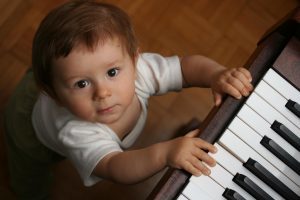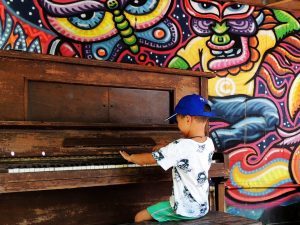The range of benefits offered by piano lessons for children is really extensive. The purpose of piano lessons is not just about providing your kids with an opportunity to learn how to play a musical instrument.
Apart from boosting the cognitive functioning of your child’s brain and sharpening his/her analytical or mathematical skills, piano lessons can surprisingly influence those young, tender minds and deeply nourish their emotional health. And the wonders of piano lessons are potent enough to last an entire lifetime. Discover the different ways in which piano lessons can help your child to shine like a radiant star, in every sphere of life.

Releasing Pent-Up Emotions with Piano Lessons
A number of studies which were conducted in the past have proved that the children who are exposed to piano lessons on a regular basis derive significant benefits in the context of their emotional development. Enrolling your children for piano lessons during their formative years provides them with a brand new emotional outlet.
Playing the piano can be really effective when it comes to releasing those pent up emotions. Be it classical music, or other popular genres such as pop or jazz, there can be no better way of giving expression to those diverse emotions. Musical training gives wings to your spirits to soar, completely irrespective of the type of music being practiced.
Keep those Temper Tantrums at Bay with Musical Training

Finding a new emotional outlet can be quite overwhelming. It not only aids in clearing the mental clutter but also enhances one’s ability to communicate with others. After all, the concept of communication solely revolves around giving appropriate expressions to your thoughts and feelings. Successfully mastering the ability to do so, can be really empowering for an individual.
Children who are given the opportunity of finding a new mode of self-expression through music, are far less prone to sudden fits of rage, emotional outbursts, or temper tantrums. Healthy emotional expression through music has a pacifying effect on the mind and prevents the accumulation of negative emotions.
Flying High with a New Lease of Confidence
The self-confidence levels of children who engage themselves in piano lessons, tend to be much higher than average. Being able to play the piano successfully, makes them feel immensely good about themselves, and automatically pushes up the levels of confidence.
They also develop an indomitable spirit. As a result, minor setbacks can never manage to dampen their willingness to innovate, experiment, and learn. Playing a song on the piano in front of an audience, tremendously enhances the self-esteem of children. Research has also revealed that piano lessons can alleviate feelings of anxiety and depression in kids.
Music Lessons for Reducing Your Child’s Emotional Vulnerability

It is quite essential for you to keep in mind that adults are not the only victims of emotional stress, anxiety, or depression. Children are equally prone to such emotional upheavals, and music can be their best friend during such trying times.
Musical training over a period of time gradually wipes out the traces of mental strain and melts away those feelings of tension or inexplicable anxiety. When a child gets stressed out for some reason, it automatically triggers a set of physical reactions. The muscles start feeling stiff, the pulse rate shoots up, and the blood pressure rapidly escalates.
Lowering Your Body’s Stress Response with Music
Practicing the piano helps in completely shutting out the body’s response to stress so that the victim feels relaxed. When such stressful situations crop up, playing the piano can be as effective as a powerful medicine. Concentrating on the notes and keys of the music instrument helps in diverting the direction of one’s thoughts. Thus, coping with adverse circumstances in life becomes much easier with the healing properties of music.
Effective coping by an individual promotes courage and increase one’s preparedness to deal with bigger challenges in the future. Playing the piano for an hour every week for a minimum period of one and a half months can reduce the stress response of your body.

Instilling Young Minds with Discipline and Patience
Did you know that playing piano can remarkably improve the concentration power of your child and increase his/her span of attention? For this reason, music training happens to be one of the most powerful tools for treating ADHD and other learning problems in kids.
Practicing to play the piano requires a lot of patience and discipline. And this new sense of discipline soon manifests itself in the other regular activities of your child. Since children are always taught to listen carefully to the teacher’s instructions, they also become more obedient and respectful in the process.
Featured Image: Image Credit
You know you are at peace with yourself if your emotions start making music instead of noise..
— αrpan ghosh (@Solving_Life_) April 28, 2016
Here’s Prince casually owning Gershwin’s ‘Summertime’ on the piano in a rehearsal sound-check #geniushttps://t.co/Jlam1VcY9J
— Jonathan Foreman (@JonEForeman) April 30, 2016
Related Articles:
LEARNING THE PIANO: 7 IMPORTANT POINTS EVERY PARENT SHOULD KNOW
THE FIRST PIANO LESSON AND BEYOND…
At this time of the year there are many children around the UK who start learning the piano. I am sure that I am just one of thousands of teachers who, this week, have had new piano pupils come for their first lessons.
The look of wonder and joy on 6 year old Natalie’s face as we explored the sounds that the piano makes just made my heart sing and her mum, who came along as well, was also clearly loving the experience! Via The Curious Piano Teachers
Science Just Discovered Something Amazing About What Childhood Piano Lessons Did to You
If your parents forced you to practice your scales by saying it would “build character,” they were onto something. The Washington Post reports that one of the largest scientific studies into music’s effect on the brain has found something striking: Musical training doesn’t just affect your musical ability — it provides tremendous benefits to children’s emotional and behavioral maturation.
The study by the University of Vermont College of Medicine found that even those who never made it past nursery rhyme songs and do-re-mi’s likely received some major developmental benefits just from playing. Via Interlude
Is Mindfulness Relevant to Piano Playing?
From 2007 to 2014, I taught an undergraduate course on mindfulness at Indiana University Bloomington that was academic yet also highly experiential. (Not surprisingly, a number of talented IU Jacobs School of Music students took my class through the years.) So it won’t come as a surprise that I will be exploring mindfulness and its relationship to piano pedagogy in this blog. First, an overview of the potential relevance of mindfulness to various aspects of piano playing.
Since its introduction into mainstream Western culture in the 1970s, mindfulness has exploded in popularity. Via Portland Piano Lab

